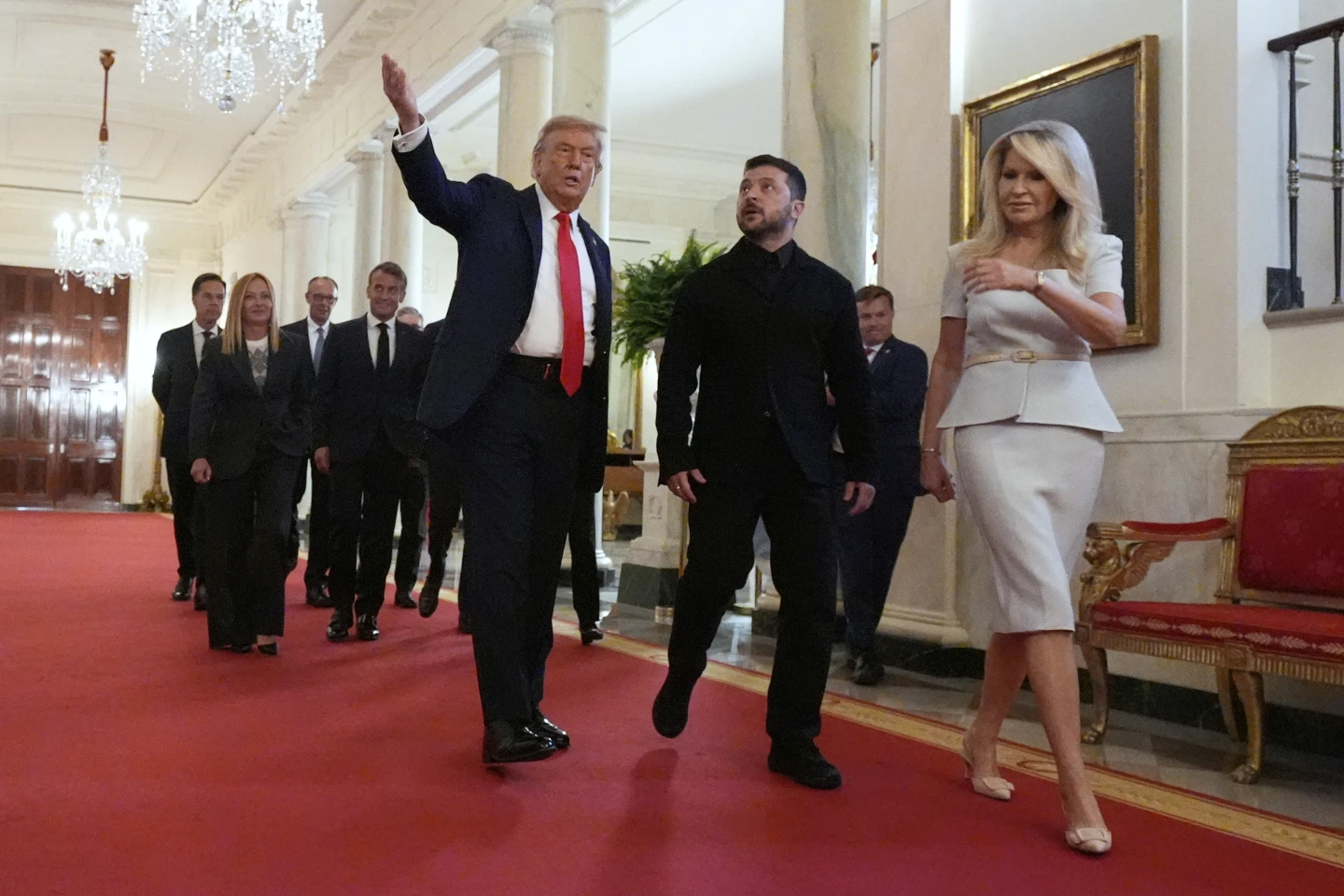During their second meeting in the Oval Office this year, President Donald Trump said the US would be willing to support European efforts to police any peace deal in Ukraine, while its leader, Volodymyr Zelenskyy expressed his gratitude and wore dressier clothes.
And Vice President JD Vance kept his mouth shut.
As Trump hosted Zelenskyy and top European leaders to energise months of stalled US-led efforts to halt Russia’s 3.5-year-old war, the tone and style of the sit-down was far different than when Ukraine’s president was hounded out of the White House in February.
Following the talks, Trump called and spoke at length to Russian President Vladimir Putin who got the red carpet treatment at a summit with Trump last Friday in Alaska, to discuss the extraordinary gathering of allies. Trump said he would now work to arrange a meeting between Zelenskyy and Putin.
US could back security guarantees for Ukraine
A central question for peace talks is how to prevent further Russian aggression in the future.
Trump has ruled out allowing Ukraine to join NATO, which would extend the military alliance’s protection to the besieged country. He did, however, express support for security guarantees for Ukraine – though details remain vague.
European countries “want to give protection and they feel very strongly about it, and we’ll help them out with that,” Trump said.
Zelenskyy responded by saying that the US was offering “such (a) strong signal.”
With Europeans looking to set up a force that could backstop any peace agreement in Ukraine, Trump suggested that Putin would be open to accepting security guarantees. His special envoy, Steve Witkoff, said Sunday, that Moscow was open to accepting NATO-style protections for Ukraine.
European leaders applauded that notion, and the larger meaning it would carry.
“When we speak about security guarantees, we speak about the whole security of the European continent,” French President Emmanuel Macron said.
Macron said talks to determine what the US is willing to provide will start as soon as Tuesday.
Praise for Trump – but tough work ahead
The Europeans came to show a united front on Ukraine, and many used public comments to heap praise on Trump. That was striking given tensions over Trump’s threats to impose steep tariffs and other issues.
Ahead of their meeting, NATO Secretary General Mark Rutte called Trump “dear Donald” and said of fighting in Ukraine: “If we play this well, we could end it.” In an interview later, Rutte called Trump “amazing” and said potential swaps of Ukrainian territory weren’t discussed.
“First, we need full clarity on security guidelines,” Rutte said. Though Ukraine might not have NATO membership, he noted, there would be discussions for security guarantees similar to those extended to members of the alliance.
British Prime Minister Keir Starmer said after the meeting that there was “real progress” and a “real sense of unity.”
Before the leaders spoke privately at the White House, European Commission President Ursula von der Leyen said all the parties were working together on “a just and lasting peace.”
Offering a more measured tone was German Chancellor Friedrich Merz, who said “the path is open now” to halting the fighting but next steps are “more complicated.”
“Let’s try to put pressure on Russia,” Merz said, adding that he would like to see a ceasefire come together.
Trump was noncommittal, saying, “If we can do the ceasefire, great,” but suggested it was far from a dealbreaker. He dropped his push for a ceasefire after Friday’s summit, aligning with Putin’s position that negotiations should focus on a long-term peace settlement instead.
The good feelings extended to Zelenskyy and Trump. After Ukraine’s leader praised the “very good conversation” with Trump, the US president responded, “Great remarks. I appreciated it.”
Speaking to reporters Monday night, Merz said the Russian demand that Ukraine give up unconquered parts of its eastern Donbas region to end the fighting would be equivalent to the US giving up Florida.
What’s next?
Trump, who bragged on numerous occasions during the campaign that he could settle Russia’s war in Ukraine in a day, said repeatedly Monday that it was far more complicated than he ever thought it would be.
But he also suggested – likely implausibly – that the fighting that has raged for years could wind down quickly.
“A week or two weeks, we’ll know whether we’re going to solve this, or if this horrible fighting is going to continue,” said Trump, even suggesting the issues yet to be hammered out weren’t “overly complex.”
Still, much remains unresolved, including red lines that are incompatible — like whether Ukraine will cede any land to Russia, the future of Ukraine’s army and whether the country will ultimately have lasting and meaningful security guarantees.
Trump said he had begun arrangements for a face-to-face meeting between Putin and Zelenskyy. But Russian foreign affairs adviser Yuri Ushakov said only that Putin and Trump had a 40-minute phone call and “spoke in favour” of continuing direct talks between the sides.
Outside the White House, Zelenskyy said no date had been set for such a meeting but that the US suggested it be as soon as possible.
“But for that, agreement of all sides is needed,” he said. He added that the question of territory “is a matter that we will leave between me and Putin.”
Though many European leaders oppose forgoing a possible ceasefire on the road to seeking lasting peace, they have supported a meeting by Trump, Zelenskyy, and Putin in the meantime. Macron suggested that another summit could feature the three presidents and also top European leaders.
“The idea of trilateral meeting is very important, because this is the only way to fix it,” the French president said.


